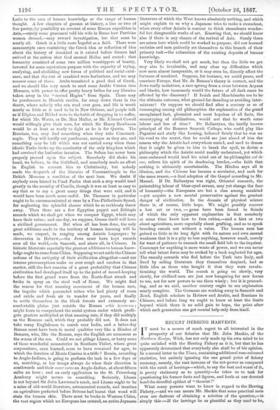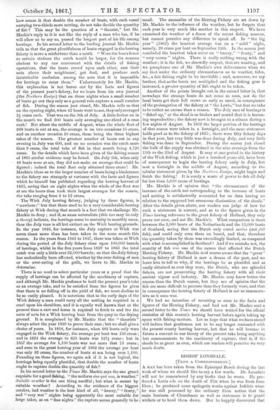RECENT HERRING HARVESTS.
I T must be a source of much regret to all interested in the
prosperity of our fisheries that Mr. John' Mackie, of the Northern Ensign, Wick, has not only made up his own mind to be quite satisfied with the Herring Fishery as it is, but that he has apparently determined that everybody else shall be of his opinion. In a second letter to the Times, containing additional rose-coloured statistics, but entirely ignoring the one grand point of fishery economy, namely, the vast increase of the net-power as compared with the catch of herrings—which, to say the best and worst of it is pretty stationary as to quantity—he takes .us to task for questioning his former facts and figures, and burls at our devoted head the dreadful epithet of " theorist !"
What many persons want to know in regard to the Herring Fishery,—and we can assure Mr. Mackie that some practical men even are desirous of obtaining a solution of the question,—is. simply this :—If the herrings be as plentiful as they used to be, bow comes it that double the number of boats, with each vessel carrying two-thirds more netting, do not take double the quantity of fish ? This may be the question of a "theorist," but Mr. Mackie's reply to it is not like the reply of a man who has, if he will allow us to say so, passed the longest part of his life among herrings. In his second letter to the leading journal Mr. Mackie tells us that the great plentifulness of boats engaged in the herring fishery is more a misfortune than a merit. "Were the boats fewer at certain stations the catch would be larger, for the reasons obvious to any one conversant with the details of fishing operations, that the boats crowd upon each other, cast their
• nets above their neighbours', get foul, and produce such inextricable confusion among the nets that it is impossible for herrings to enter them." Unfortunately for Mr. Mackie, this explanation is not borne out by the facts and figures of the present year's fishery, for we learn from his own journal (the Northern Ensign) that on those nights when a small number of boats go out they only as a general rule capture a small number of fish. During the season just closed, Mr. Mackie tells us that on the opening night, when 42 boats went to sea, they onlyaveraged 2i crane each. That was on the 9th of July. A little father on in the month we find 300 boats only averaging one-third of a cran each ! But about the middle of August, when the whole fleet of 968 boats is out at sea, the average is on two occasions 15 crans, and on another occasion 10 crans, these being the three highest takes of the season. The greatest number of boats out in any evening in July was 600, and on no occasion was the catch more than 9 crans, the total take of fish in that month being 4,720 crane. In the details which have been given of the fishing season of 1865 similar evidence may be found. On July 6th, when only
• 48 boats were at sea, they did not make an average that could be figured ; indeed the total fleet only obtained three crass! Mr. Mackie's ideas as to the larger number of boats being a hinderance to the fishery are strangely at variance with the facts and figures which he himself has published regarding the herring harvest of 1865, seeing that on eight nights when the whole of the fleet was at sea the boats then took their largest averages for the season, the take ranging from 6 to 12 cram.
The Wick July herring fishery, judging by these figures, is "nowhere ;" but that there used to be a very considerable herring fishery at Wick during that month is a fact that we challenge Mr. Mackie to deny ; and if, as some naturalists (this too may be only a theory) indicate, the herrings come to maturity in monthly races, then the July race is all but extinct on the Wick herring grounds. In the year 1846, for instance, the July capture at Wick was seven times more than has been taken in the same month this season. In the years from 1843 to 1847, there was taken at Wick during the period of the July fishery close upon 100,000 barrels of herrings, whilst in the five years from 1859 to 1863 the total catch was only a little over 36,000 barrels; so that the July fishery has undoubtedly been affected, whether by the over-fishing of men or the over-eating of the gulls, we leave to Mr. Mackie to determine.
There is no need to select particular years as a proof that the supply of herrings can be affected by the machinery of capture, and although Mr. Mackie professes to hold the present year's take as an average take, and to be satisfied from the figures he gives that there is no falling off in the yield of fish, we must decline to be so easily pleased. It is notorious that in the early days of the Wick fishery a man could carry all the netting he required in a creel upon his shoulders, and it is equally well known that at the present time a cart and horse is required to fetch to and fro the suite of nets for a Wick herring boat from the quay to the drying ground. It is complained by Mr. Mackie that the "theorists" always select the year 1820 to prove their case ; but we shall give a choice of years. In 1818, for instance, when 482 boats only were engaged in the Wick fishery, the average per boat was 136 craus ; and in 1824 the average to 625 boats was 123i crans; but in 1857 the average for 1,100 boats was not more that 73 cram ; and even in the great herring year of 1862 the average per boat was only 82 cram, the number of boats at sea being over 1,100. Founding on these figures, we again ask if it is not logical, the herrings being equally plentiful, that double the number of boats ought to capture double the quantity of fish?
In his second letter to the Times Mr. Mackie says the one grand requisite for a good fishing, "the uniform sine quii non, is weather." Suitable weather is the one thing needful ; but what is meant by suitable weather? According to the evidence of the biggest catches, bad weather is the best kind of all, "breezy," "frosty," and "very wet" nights being apparently the most suitable for large takes, as on "fine nights" the capture seems generally to be
small. The anomalies of the Herring Fishery are set down by Mr. Mackie to the influence of the weather, but he forgets that each year is very much like another in this respect. We have examined the weather of a dozen of the recent fishing seasons, but cannot perceive any difference to speak off. In "time big year" (1862) the heaviest average was on a " mild " night, namely, 20 crans per boat on September 11th. In the season just concluded the heaviest takes occur on "breezy," "frosty," and "very coarse" nights. There is really nothing wrong with the weather ; it is the fish, we shrewdly suspect, that are wanting, and we paraphrase one of Mr Mackie's own deliverances when we say that under the ordinary circumstances as to weather, tides, &c., a fair fishing ought to be inevitable ; and, moreover, we say further, that as the boats are multiplied and the fishing gear is increased, a greater quantity of fish ought to be taken.
Another of the points brought out in the second letter is, that nowadays the strange boats do not come so soon, nor do. the local boats get their full crews so early as usual, in consequence of the prolongation of the fishery at "the Lewis," but that we take to be rather an excuse than a reason. The July race of herrings is "fished up," or the shoal is so broken and scared that it is becom- ing unproductive ; the fishery now is brought to a climax during a few nights of August. In 1862 the larger portion of the herrings of that season were taken in a fortnight, and the same statement holds good as to the fishery of 1865; there were fifty fishery days in that year, but very little was done during July, and very little fishing was done in September. During the season just closed the bulk of the supply was obtained in the nine evenings from the 13th to the 23rd of August. It may at one period in the history of the Wick fishing, which is just a hundred years old, have been of consequence to begin the herring fishery early in July, but now a fortnight in the middle of August, according to the tabular statement given by the Northern Ensign, might begin and finish the fishing ! It is surely a waste of power to fish all July for less than 5,000 crams of herrings.
Mr. Mackie is of opinion that "the circumstance of the increase of the catch not corresponding to the increase of boats and netting is satisfactorily accounted for on data having no relation to the supposed but erroneous diminution of the shoals." After the details given above, our readers can judge of how far such a statement is correct, and as to the figures given in the Times having reference to the great fishery of Holland, they only prove our case, and not Mr. Mackie's. What comparison is there between the 3,000 boats of the Netherlands and the 13,000 boats of Scotland, seeing that the Dutch only cured miles (not full fish), and could only cure them on board, and that, therefore the quantity taken by them was exceedingly limited, as compared with what is accomplished in Scotland ? And if we mistake not, the scarcity of fish was one of the causes that affected the Dutch Herring Fishery. Mr. Mackie is of course aware that the "great" herring fishery of Holland is now a dream of the past, and we leave him to tell us why, if the herrings be as plentiful and as easily obtained as ever they were, the Dutch, who are splendid fishers, are not prosecuting the herring fishery with all their ancient vigour and industry. Mr. Mackie may know better the reason than the Dutch curers, but they are of opinion that the fish are more difficult to procure than they formerly were, and that in consequence the herring fishery of Holland is not so remunera- tive as it once was.
We had no intention of recurring so soon to the facts and figures of the Herring Fishery, and had not Mr. Mackie sent a second letter to the Times we should have waited for the official statistics of this season's herring harvest before again taking up space with fishing matters. Let us hope that what we have stated will induce that gentleman not to be any longer contented with the present scanty herring harvest, but that he will become in future a convert to our theory of the present take being anything but commensurate to the machinery of capture, that is, if the shoals be as great as ever, which our readers will perceive we very much doubt.



































 Previous page
Previous page